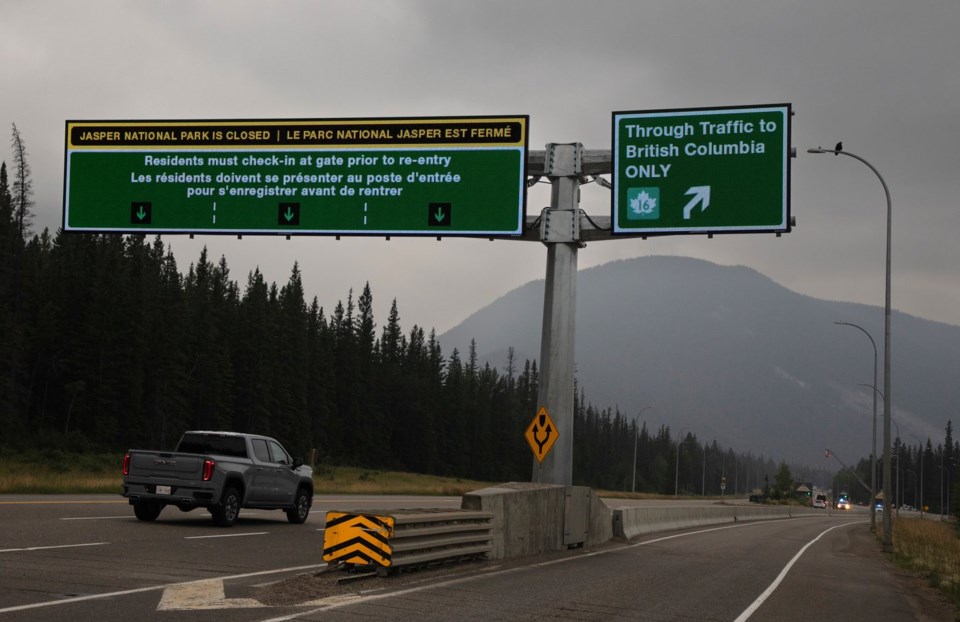JASPER, ALBERTA, CANADA — More than three weeks after everyone in Jasper had to flee raging wildfires through a curtain of darkness and smoke, some returned Friday morning, greeted by soot-covered tree stumps, Mounties, and long lines of orange traffic cones.
"Welcome Back" was written on a banner at the RCMP checkpoint into the Rocky Mountain tourist town.
Residents came in a sporadic line of cars, trucks and recreational vehicles. One pickup had a refrigerator in its bed. They moved along the main highway through Jasper National Park to the point where it branches off to the east side of the town.
There, police used pylons to divide the two-lane highway into three. Residents were being advised by officers patrolling the road to use the right lane to enter the town while those passing through were told to stay in the middle and keep driving.
The sky was partly cloudy and the air thick with the smell of smoke. Those driving in from the east could see swaths of trees burned to black skeletons alongside patches of green grass.
Near the east entrance to the park is the town of Hinton, which has served as the command point for those fighting the fires.
Hinton Fire Chief Mac de Beaudrap was at the entrance waving to returnees, trying to make the re-entry feel “homey.”
He said the return is "the beginning of the end," for the emergency phase, but it "will be, for a lot of people, a very long road ahead of them."
He said traffic has been slow, steady, calm and organized.
"Most people are glad to see that we’re still here," he said.
Only those who live in Jasper were allowed to return. Park and town officials said they want to give residents time and privacy to assess the damage to homes and businesses before visitors return. No time has been set for full access to the community.
The return comes 25 days after wildfires cut road access and forced the town’s 5,000 residents, along with about 20,000 park visitors, to flee west into British Columbia on the night of July 22.
Two days later, the fire overwhelmed crews and hit the town, destroying 358 buildings, most of them businesses and homes, leaving the remaining two-thirds of the town either untouched or damaged by smoke, soot and water.
Key infrastructure, including water treatment plants and schools, were spared, but a lot of work remains.
Officials are scrambling to repair smoke-damaged schools ahead of the return to classes in September, cleaning and fixing everything from fire alarms to fish tanks.
While residents can come back, they have also been told to be ready to leave again with one hour’s notice.
The fire menacing the community remains out of control at 330 square kilometres, but its northwest perimeter has been fully contained to protect the town.
Inside the town, residents were directed to a re-entry support centre to have questions answered on internet service, utilities, insurance and health. Essential services resumed: the medical clinic, bank, gas station, grocery store and pharmacist, along with the police station and fire department.
The town warned the smell of smoke, depending on the wind direction, could be overwhelming, and urged people to have N95 masks at the ready.
There was also a line of ATCO trucks heading into town. Residents were given placards to put in their windows if they wanted the utility company to come and relight gas service.
Residents were told watch out for unstable structures, deep burning ash pits, soot, demolition dust, nails and other sharp objects, as well as poorly ventilated spaces that may contain carbon monoxide.
People were being told to not dump ruined mattresses, couches or appliances on the curb or leave out food waste or anything else that could attract wildlife.
There are no accommodations for those with destroyed homes and businesses. However, town bylaws have been relaxed for the next month to allow trailers and recreational vehicles to be left unattached on a roadway as transitional housing.
Some 800 housing units were lost in the blaze.
Alberta Municipal Affairs Minister Ric McIver reiterated that all Jasper residents should fill out the municipality's housing survey in an effort to plan to meet housing needs, including by placing some people in any extra space available in homes still standing.
"You've got to get people in there to have the economy recover, and you can't have the economy recover until the people are there, so that's a chicken-and-egg thing," said McIver in a virtual news conference.
McIver stressed that housing options will depend on the size of the household, insurance coverage and ownership status. He said authorities would be looking at a range of needs from short-term to long-term.
This report by The Canadian Press was first published Aug. 16, 2024.
Fakiha Baig and Jack Farrell, The Canadian Press

